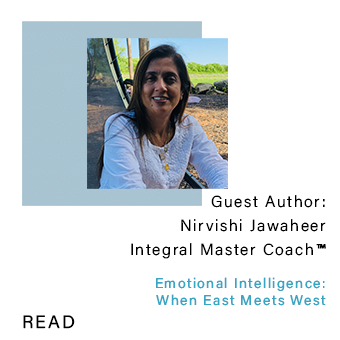Blog

“I've rarely experienced a 'training' program that so effectively combines rigorous methodology with generous heart. I now have a living compendium of precise, relevant practices.”
“Working with Joanne and Laura has been transformational at many levels of my life. Through their Integral Coaching® training, I have come to understand what “being human” means.”
“Integral Coaching Canada provides what we believe is the most complete and comprehensive coaching program available. ”

Emotional Intelligence: When East Meets West
One of the key gems I gained through my coaching training with Integral Coaching Canada is the appreciation of how we have each had a unique pathway of development from the time we were born to where we are right now. Some capacities were significantly developed, while others were less developed. This is not good or bad, but it is important to become awake to and fully own the levels of capability we have, and where we have opportunities to further grow in our adult lives. This is my story about my unique pathway of development having been born in the East while receiving a Western education, and what I came to discover was the pivotal area I needed to develop as an adult in order for me to live the life I have always dreamt of living.
My scientific background, passion for learning, and for helping others led me to a career path that has brought meaningful change in my life and the lives of others. I am a pharmacist-owner with an MBA, an Integral Master Coach™, an ICF Professional Certified Coach, and a tutor at the University of Montreal. I have had the privilege of travelling extensively and living in different countries: Mauritius, France, USA, and Canada. My cultural diversity, fluency in different languages and sensitivity to the needs of others has added to my passion of helping others and alleviating suffering. However, in my most recent years, I discovered that I needed to develop my emotional capacities to remain fully present to the strong emotions of others, as well as my own strong emotions, if I was going to advance the depths and ways in which I am of service to others. My Integral Coaching® training through Integral Coaching Canada helped me awaken to this and through the development of these emotional capacities, my life has been powerfully transformed.
I am fond of this story from my childhood which I share dearly with my cousins: when we visited relatives and I was asked a question; I was not even expected to answer. The questions were addressed to my mother on my behalf. My role was to smile and agree. My parents decided everything for me. My behavior had to be exemplary, and I had learnt at a very early age to read adult facial expressions and respond accordingly. My fate depended on it. It was an authoritarian parenting style that marked my childhood. This style of parenting was devoid of warmth and my emotional needs were not taken into consideration. In contrast with my Eastern upbringing, I had a Western education. My parents believed in higher education for girls and my path to university had been paved.
In university, I went from a space of control to a space of freedom. My emotional barometer took a hit. In my earlier life, my parents had complete control and I grew accustomed to the fact that I had no say in my own life. I had developed a sense of gratitude towards everything they had done for me, and the guilt of displeasing them was continuously in the background. I did not talk back or contradict elders even if they were wrong. My external expression of emotions was that of a soft-spoken, quiet, very respectful, resilient human being with a very high capacity to soothe myself. In the Western world, I kept my distance with others and smiled from afar. Hugging was a bit of a stretch for me. My way of being with its limited portfolio of emotions served me well in the Western world. I was quiet, hardworking, always smiling, and did what was required of me. I felt that I should not ask for anything. My boss would acknowledge my way of being and the asset I was to the company and behave accordingly. I was lucky in that my bosses were decent human beings. However, I found any criticisms of my work hard to take. According to me, I had covered all my bases and any criticisms were a sign of injustice. The business world also matched my sterile way of expressing emotions and seemed to embraced Descartes’ proposition that “I think, therefore I am.” My emotional cues were giving me the wrong information about the world around me, and I often judged any display of emotion I was not familiar with.
My view of myself was that I was kind and understanding and people loved being around me. I built strong connections with people and I felt that I had this whole emotional intelligence thing covered. Consider my shock when I began my training with Integral Coaching Canada and realized that my emotional line of development was low. How could that be? I was in disbelief. That was not possible, the people I was close to also had ways of being similar to my own, and I tried to convince myself for a long time that I was self-aware and could read the emotional states of others. I only started to change when I emptied my cup and was ready to embrace something new. I was able to do this because I had access to some amazing Integral Coaches™, and my family was very supportive and held my hand along this journey of discovery. It was not easy for them or for me. My practices were focused on discovering what each emotion meant and how it was expressed in different cultures. I was also a little excessive in the knowledge and embodiment I tried to acquire. I read as many books as I could in neuroscience, emotional intelligence, science of emotions, understanding emotions and took many classes related to this topic. Hard to expect anything else from an Enneagram 7.
What had changed for me was that I befriended this line of development in an intimate way. I am now at ease with my triggers and displays of emotions. I can understand how they show up in my body, and the harm and the good they can do. I am able to read and express strong emotions in myself and others and forgive myself for my humanity when strong emotions are present in me. I can be present with what was going on in my body and in others, and embrace both of our emotions rather than brushing them under the carpet to be hidden. I am not afraid to express myself and have these difficult conversations with others, while still keeping the essence of who I am. Human contact is not a taboo anymore and hugs are a way of life for me now. This change did not come overnight. It came through practice and having a persistent mindset. I can now embrace my biculturalism of East and West as a gift which I express in my work as an Integral Coach™, a pharmacy owner, and a teacher.
Some of my work as an Integral Coach™ has been with young adults who are studying to be health professionals. In order to be of service to others we have to have competencies in our field and good bedside manners. Many health professionals take a parental role with a minimum need to know philosophy with their patients: They feel that they know what is good for their patients and do not take the patients’ beliefs into consideration. A more Integral role for a health professional would be providing knowledge, structure, and support to the patient and co-creating with their patients the best path to better health. Through my direct experience, this approach enhances the success rate patients have in actually following through on the health treatment needed for their healing and well-being. Health professionals, especially in pharmacy, go through a very competitive path to get where they are, and many are in sync with Descartes’ emphasis of the power of the mind, with little concern for emotional intelligence. I am very empathic towards them, and understand their difficulties, distress, and what is expected of them. I have to say that I was once there too, but I have since realized that my professional life is rooted in being of service to others.
Integral Coaching® has also brought me so much more than I bargained for on a personal level. My relationship with my husband and daughter is one I always yearned for all my life. I am able to express and show them how I really feel, and what used to feel like my emotional void filling up with feelings I did not even know existed. I feel fulfilled that I chose an Integral path of life of learning and practice, which will continue through the remainder of my life.

Curious about advancing your own capacity with emotion? Here’s a practice to get you started:
Practice: Expanding Your Emotional Vocabulary
The aim of this practice is to develop better insight into how you are feeling by naming a strong emotion as it shows up. Having an extensive vocabulary to describe exactly how you feel helps deepen your self-awareness about the range of emotions that exist and increases your connection to them. I often give this practice to my students studying to be heath professionals as a good first step towards becoming emotionally fluent with their patients.
Weekly
Two or three times a week when you experience a strong emotion, pause and take a moment to feel it in your body. Once you can feel it, try and name the emotion and come up with another word that also describes how you are feeling. Pay attention to how you react to the strong emotion after doing this practice.
At the end of the day, take 10 to 15 minutes to reflect back on the feeling and respond to the following questions in a journal.
- Where did you feel that strong emotion in your body?
- How did naming the emotion change the way you were going to react?
- What else did you learn about the strong emotion when you used another word to describe it?
After Two Weeks
Please read through what you have jotted down for the past two weeks and reflect on the following questions:
- What does naming a strong emotion and where you feel it in your body open up for you?
- How does expanding your emotional vocabulary help you read the emotional cues of others?
- In what ways are you noticing shifts in how others are relating to you as you become more familiar with your own strong emotions?










